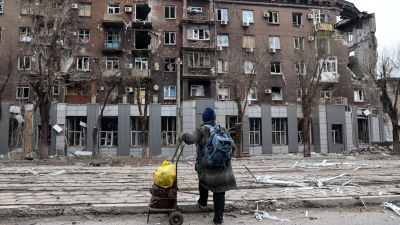Ukrainian city of Mariupol warns of danger of deadly epidemics as thousands of corpses decompose

Ukrainian authorities are sounding the alarm about the unsanitary, "medieval" conditions in the besieged city of Mariupol, which they say are a "deadly danger" to those still alive there.
Mariupol City Council said on the messaging app Telegram on Thursday that "deadly epidemics" could break out in the ravaged port city, in part due to the "decomposition of thousands of corpses under the rubble".
The city's mayor has previously said at least 21,000 people have been killed in Mariupol.
The council said "the lack of centralised water supply and sewerage", along with "a catastrophic shortage of drinking water and food", also left the city's inhabitants vulnerable to diseases like cholera and dysentery.
The Telegram post cited Mariupol Mayor Vadym Boychenko as saying that “the invaders are not able to provide the remaining population with food, water and medicines — or are simply not interested in that".
He added “living conditions in the ruined Mariupol are now medieval” and called for “an immediate and complete evacuation".
Mariupol has been reduced to rubble after two months of bombardment from Russia's forces, but the Azovstal steelworks, a mammoth steel plant with a 15-mile maze of underground channels, is the last pocket of Ukrainian resistance.
Much of the rest of the city is thought to be under Russian control.
The Russian troops have pummelled the seaside plant with relentless airstrikes and artillery barrage, trying to uproot the 1,000 civilians and 2,000 troops living in bunkers under the wrecked structure.
And Ukrainian troops said on Thursday that an intensive Russian bombing had inflicted yet more casualties.
The Azov Regiment, which is holed up in the plant, posted a video showing people combing through the rubble to remove the dead bodies and help the wounded after the bombing overnight.
The Regiment said the Russians had hit an improvised underground hospital and surgery room, killing an unspecified number of people and wounding others.
The video could not be independently verified.
A spokesperson for the Azov Regiment previously told ITV News that those requiring surgeries inside the plant had been operated on by sleep-deprived, overworked medics.
"The working conditions for doctors are horrible, as attacks of Russian aviation and artillery are constant", Valeria Karpylenko said.
"They are in medieval circumstances for the surgeries, they have only basic light during operations."
Soldiers with lost limbs are among the injured, Ms Karpylenko said.
ITV News is not able to verify whether this makeshift hospital is the same one which is claimed to have been hit overnight.
Ukrainian President Volodymyr Zelenskyy said at a news conference on Thursday that Ukraine is ready for "immediate negotiations" with Russia on the evacuation of people from Azovstal, which he said was "being bombed barbarously by the Russian army".
"We also hope that there will be a humane attitude towards these people on the part of Russia," Mr Zelenskyy added.
The president's appeal came after the United Nations (UN) said on Wednesday that an agreement had been reached on arranging evacuations from Azovstal, after UN secretary-general Antonio Guterres and Russian president Vladimir Putin met one-on-one for discussions on Tuesday.
For expert analysis and insight on the biggest stories listen to our podcast to find out What You Need To Know